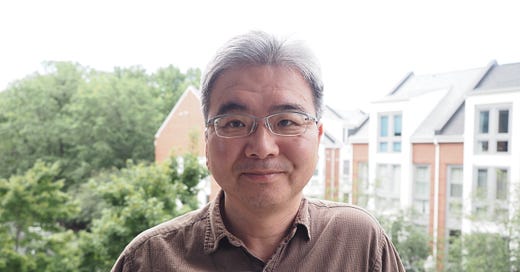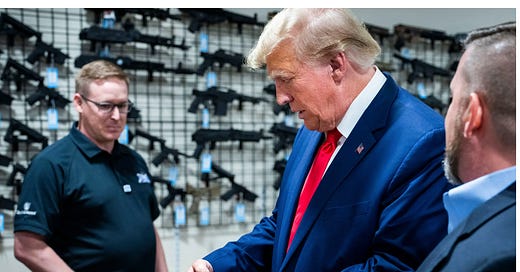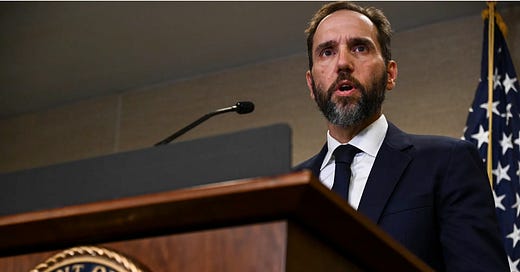
"If you want to be the leader of the free world, you have to have to clean up your own household." Takashi Oshima on US politics
I'm pleased to bring you this interview with Takashi Oshima, U.S. correspondent for The Asahi Shimbun, a major Japanese newspaper. Oshima is based in Washington D.C. and covers U.S. politics. He previously worked in Tokyo as deputy editor at Asahi’s Political News and International News Departments. Oshima was a Nieman Fellow at Harvard University in 2006 and holds a master’s degree from Harvard University’s Kennedy School of Government.
This is the first of a series of conversations I am having with journalists and analysts who will give a foreign perspective on the situation in the United States.
Ruth Ben-Ghiat (RBG) You've been in the United States off and on for some years, covering American politics. I'm curious how you view the changes in the political climate over the last few years, and the challenges we face now as a democracy.
Takashi Oshima (TO): Trump was the symptom, not the cause. He came out of changes I started to see in the 2010-2012 years. I wasn't surprised when Trump came out as a candidate in the 2016 election. Having said that, what happened last year, with the argument that the election was stolen, and January 6th, was shocking from a foreign perspective.
Larry Hogan, the governor of Maryland said in 2020 that the United States is starting to look like a banana republic. It was an unfortunate thing to say, but he was not wrong. All around America we now see that candidates who lose say their election was rigged. That happens in many countries. But people around the world didn't think that would happen in this country, the United States.
Another thing that was difficult for people outside of the United States to understand was that we didn't expect that Trump would keep saying that the election was stolen. I get this question from many colleagues and readers: why do so many people still believe that the election was stolen? Polls say that about 30% of American people, and up to 70% of Republicans, believe that this election was stolen, and that Biden was not legitimately elected. And that is something very difficult for foreigners to understand.
What I'm trying to do right now as a journalist is to talk to Trump supporters and try to understand their mindset, why they still believe what former President Trump says.
When I was in Wyoming last week, I talked to more than 20 Republicans, and only one Republican said he still supports Liz Cheney. You are in New York City, I'm in Washington DC, and many people here in DC, no matter if you're a Democrat or Republican, see Cheney in a positive light and think she is courageous.
But in Wyoming, which is supposed to be Cheney country, home of the Cheney dynasty, a majority of Republicans feel anger and resentment toward her. Many people told me, "She doesn't represent us." Or they feel they've been betrayed by her. I found it interesting that people reacted so strongly, it's a sign of the "us versus them" mindset. We now have two worlds in one nation. It's really gone too far.
RBG: As a foreign correspondent, you're a translator of America for the Japanese reader. How did you explain January 6th?
TO: I was there at the January 6th rally. I saw the anger in the participants. I saw President Trump, and the other speakers at the podium, putting a fire under their anger.
I was thinking something could happen, but I wasn't anticipating that people would actually break into the Capitol building. So of course it made news all around the world. That was something not supposed to happen in this country --a country founded on the principles of freedom, democracy, and the rule of law. So, it was very shocking and sad.
RBG: Have you seen a big change in U.S., Japanese relations in the passage from the Trump to the Biden administration?
TO: During the Trump era, many countries, including Japan, still had to live with the United States. There were problems because of President Trump's America First policy. He kept complaining about allies, including Japan and South Korea, not taking on enough of the financial and other burdens of national security.
After the Biden administration, Biden allowed for a return to normality, since the US returned to the World Health Organization and to a focus on climate change.
As I said earlier, countries around the world see the United States as a leader of democracy. But there are now concerns due to the domestic situation. The Biden administration says that they're going to have the democracy summit in December, which is good. But if you want to be the leader of the free world, you are going to have to clean up your own household. Otherwise, your voice won't be heard.
RBG: That's the challenge to American credibility right now.
TO: Yes. It's a matter of credibility. And that credibility has been shaken, unfortunately. The other problem is that because of the power and influence the US has in the world, what happens there impacts other countries. Take Brazil. President Bolsonaro argued a few months ago that if he loses the presidential election next year, it will be because of election fraud. He is using the same playbook that former President Trump did.
RBG: Japan is part of an alliance with the US, Australia, and India designed to be a kind of buffer to China. China is in a period of repression in both domestic and foreign policy realms. The intensification of Xi's personality cult, and the recall to Mao, are measures of that. Do you see a period of greater instability coming in the Pacific, around Taiwan, Hong Kong, and more generally?
TO: Well, we don't know yet, but one of the big concerns is the increasing personality cult of Xi Jinping. It looks like China is going back to the Mao Zedong era in that regard. The big difference between the Mao era and now, though, is that then China may have been a big country, but economically it was very small, and its military didn't have much impact on the outside world.
Now, China is economically very powerful and its military has very advanced equipment. It's concerning that China seems to be more confident about the way they rule the country, politically. I think they started to feel that they are doing better than the democratic countries --one example was the handling of the COVID crisis. This greater confidence is leading them to be more aggressive.
I think that's the biggest concern, especially for countries around China, like Japan, South Korea, and South Asian countries. These countries feel more direct pressure from China. But at the same time, they have very strong economic ties to China, through trade. I think that makes it very difficult to know how to deal with China.
RBG: So many countries, including the U.S., are dependent on Chinese products. So that makes the effort to put pressure on the country to enact human rights or other reforms very difficult.
TO: The Biden administration says that today in the world we have a competition between democracy and autocracy. That might be true. But I think the problem democratic countries face now is not primarily the danger of being attacked by the other countries. The challenges American democracy is facing right now, for example, come from internal problems, from inside your own country. So that's what we are going to have to deal with.











I was reading Garry Kasparov's twitter feed the other day and took note of a group of dissidents who have lived under autocratic/authoritarian control (as Kasparov did) speaking to what life is really like under these regimes. Americans are being lulled into the belief that democracy has had its day, that it is inherently inefficient, antiquated and that in order to compete on the world stage, we need a strong 'unitary executive' in charge. Call it authoritarianism, fascism. whatever. Former Attorney General William Barr was a keen proponent of the theory. We watched how that turned out.
Those from Renew Democracy's Frontlines of Freedom would beg to differ with the cheers for autocratic rule. They've lived under these political systems and have the subsequent horror stories to share.
I think we need these voices from outside the American bubble to voice their concerns, worries, real-life experiences. The question is will the narrative penetrate? That's where American journalists and publications need to come in, have the courage to dump the 'bothsiderism' schtick and defend basic American values, the very ones Mr. Asahi Shimbun notes: freedom, democracy, the rule of law. We need to be as loud and effective as those who would burn the house down. It's an all hands on deck moment. Every voice defending democratic principles is worthy and needed.
President Biden has stated before: domestic policy is foreign policy; foreign policy is domestic policy. If we refuse to lead by our values and principles both home and abroad, we hobble any attempt at renewal.
Another good interview!
First, thanks for starting this series of interviews w international journalists, it's a great idea and important to hear their perspectives. We suffer from a lack of outside perspectives in the US.
Second, he says "The Biden administration says that today in the world we have a competition between democracy and autocracy." Now if only Biden would say that this problem is HERE, in this country, and acknowledge the problem, then take it head on. I'm not holding my breath, though.